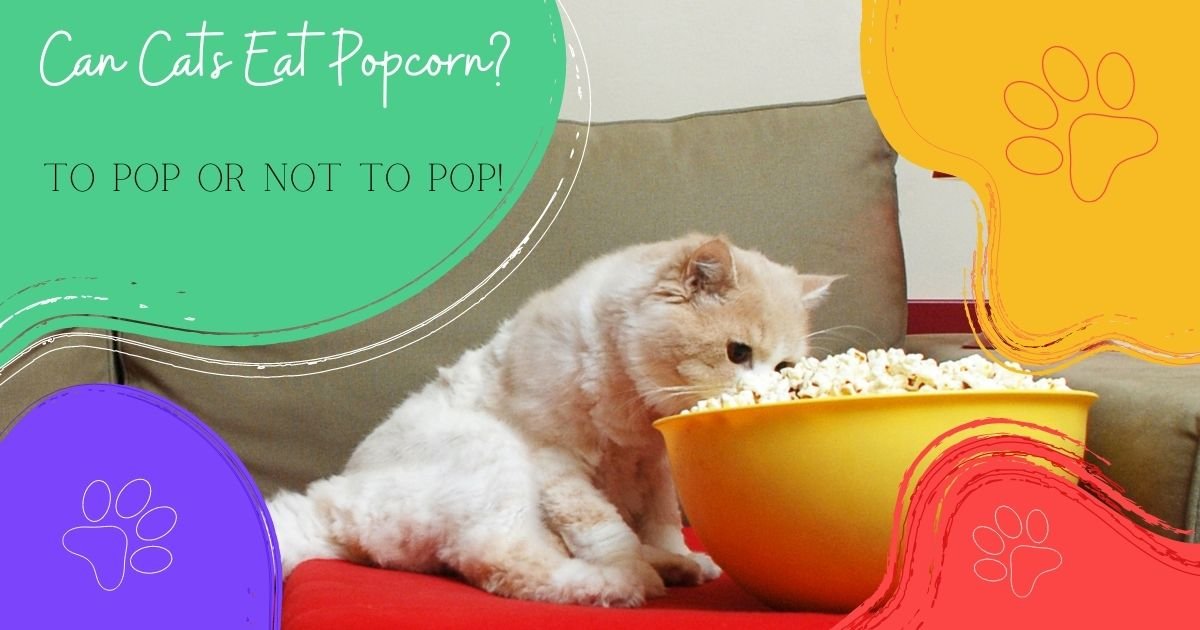Cats are curious creatures, and their inquisitive nature often leads them to explore the food we eat. If you’ve ever settled in for a movie night with a bowl of popcorn, you may have noticed your feline friend eyeing those fluffy kernels with interest. But can cats eat popcorn? Is it safe for them, or could it pose a risk to their health? In this guide, we’ll explore everything cat owners need to know about feeding popcorn to their pets.
The Basics: Is Popcorn Safe for Cats?
Popcorn itself is not toxic to cats, so if your cat snatches a piece from your bowl, you don’t need to panic. Plain, air-popped popcorn without any added ingredients is generally safe for cats to consume in small amounts. However, it’s important to note that popcorn does not provide any nutritional benefits to cats, and it should not be a regular part of their diet.
Why Popcorn May Not Be Ideal for Cats
While plain popcorn isn’t harmful, it’s not particularly good for cats either. Here’s why:
Lack of Nutritional Value: Cats are obligate carnivores, which means they require a diet primarily composed of meat. Their digestive systems are not designed to process grains, and popcorn offers no essential nutrients that contribute to their health. Feeding them popcorn can fill their stomachs with empty calories, potentially reducing their appetite for more nutritious food.
Choking Hazard: Popcorn kernels can be a choking hazard, especially if your cat tries to eat a piece that is too large or hard. Even fully popped kernels can pose a risk if your cat swallows them whole without chewing.
Potential for Digestive Issues: Cats have sensitive digestive systems, and even a small amount of popcorn can sometimes cause stomach upset, leading to vomiting or diarrhea.
The Dangers of Seasoned or Flavored Popcorn
While plain popcorn is relatively safe, the same cannot be said for popcorn that has been flavored or seasoned. Here are some common popcorn additives that can be harmful to cats:
Butter and Oil: Popcorn that has been popped in butter or oil is high in fat, which can lead to obesity and digestive problems in cats. Additionally, the high-fat content can cause pancreatitis, a serious condition that requires veterinary care.
Salt: Many popcorn varieties are heavily salted, and excessive salt intake can be dangerous for cats. It can lead to dehydration, electrolyte imbalances, and even sodium ion poisoning in severe cases.
Cheese and Other Seasonings: Flavored popcorn, such as cheese-coated or caramel popcorn, often contains artificial ingredients, preservatives, and other chemicals that are not safe for cats. Some seasonings, like garlic or onion powder, are toxic to cats and can cause severe health issues.
Sugar: Sweet popcorn varieties, like caramel or kettle corn, contain high levels of sugar, which can lead to obesity, diabetes, and dental problems in cats.
For More Information Click Here: Can Cats Eat Popcorn
What to Do If Your Cat Eats Popcorn
If your cat manages to get hold of some plain popcorn, there’s usually no need to worry. However, if your cat consumes seasoned or flavored popcorn, it’s important to monitor them closely for any signs of distress, such as vomiting, diarrhea, lethargy, or excessive thirst.
If you notice any unusual symptoms or if your cat has ingested a large amount of flavored popcorn, contact your veterinarian immediately. They can guide whether further action is necessary and help ensure your cat stays healthy.
Safe Treat Alternatives for Cats
While it’s best to avoid giving your cat popcorn, there are plenty of safe and healthy alternatives you can offer as treats:
Commercial Cat Treats: There are many cat treats available on the market that are specifically formulated to meet your cat’s nutritional needs. Look for treats that are low in calories and made from high-quality ingredients.
Cooked Meat: Small pieces of cooked chicken, turkey, or fish make excellent treats for cats. Just be sure to remove any bones, skin, and seasoning before offering them to your pet.
Catnip: Many cats love catnip, and it’s a great way to give them a treat without adding extra calories to their diet. You can offer catnip in dried form or buy catnip-infused toys.
Freeze-Dried Treats: Freeze-dried meat or fish treats are another excellent option for cats. These treats retain most of the nutritional value of the original meat and are free from additives or preservatives.
Fresh Vegetables: Some cats enjoy nibbling on small pieces of vegetables like carrots or peas. While vegetables should not make up a large part of a cat’s diet, they can be an occasional low-calorie treat.
Conclusion: Should You Give Your Cat Popcorn?
While plain popcorn is not harmful to cats, it’s not an ideal treat. Cats have specific dietary needs that are best met through a balanced, meat-based diet, and popcorn offers no nutritional benefits to them. Additionally, flavored or seasoned popcorn can pose significant health risks, making it a poor choice for sharing with your feline friend.
If you want to treat your cat, it’s best to stick with options specifically designed for their dietary needs. By choosing safe, healthy treats, you can ensure your cat stays happy while avoiding potential risks.
Remember, the best way to show your cat love is by providing a diet that supports their health and well-being. So next time you settle in for a movie, enjoy your popcorn—but keep it out of your cat’s reach. for more information visit cleverblogger.





Can you be more specific about the content of your article? After reading it, I still have some doubts. Hope you can help me.